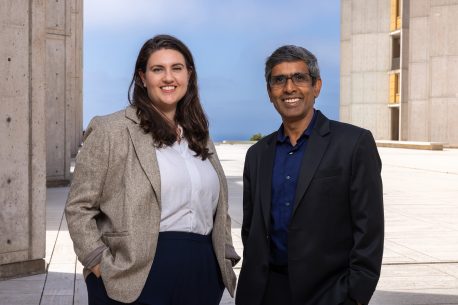
May 12, 2025
LA JOLLA—Salk Institute Professor Satchidananda Panda has been named a semifinalist in the XPRIZE Healthspan competition. Panda’s team is known for its expertise in circadian rhythms, the body’s internal timetable that determines the timing of our behaviors, such as sleep and wakefulness, and almost every bodily function.
XPRIZE Healthspan is a global seven-year, $101 million competition to revolutionize the way we approach human aging. Finalists will be selected based on their therapeutic innovations that restore muscle, cognition, and immune function by a minimum of 10 years, with an ambitious goal of 20 years, and deliver their therapy in one year or less for adults aged 50-80 years who are free of major or life-threatening disease and disability.

Panda‘s project, called “Circadian,” hypothesizes that personalized circadian rhythm optimization, alone or in combination with therapies for existing conditions, can substantially enhance healthspan—the period of our lifetimes during which we remain in good health. His prior published studies with Emily Manoogian, a staff scientist in his lab, demonstrated that optimizing just one aspect of circadian rhythm by time-restricted eating—the most popular form of intermittent fasting—can reduce the burden of metabolic diseases in young and middle-aged adults. Building on this discovery, they proposed that a comprehensive circadian rhythm optimization can substantially increase healthspan among older adults.
“Being named a semifinalist in the XPRIZE Healthspan competition is both an honor and a testament to the importance of understanding how our daily routines—when we eat, sleep, and move— affect our long-term health,” says Panda, who holds the Rita and Richard Atkinson Chair at Salk. “Our work demonstrates that optimizing these rhythms can dramatically improve physical, cognitive, and immune functions, potentially making us younger.”
As a semifinalist, Panda will receive $250,000 to test the feasibility of this concept in a small group of adults aged 55-80 years old. The Circadian team—world-class experts in nutrition, sleep, heart health, immune health, mitochondria function, cognition, and exercise physiology—will design and deliver personalized circadian lifestyle optimization plans for each study participant. The plans will focus on the quality, quantity, and timing of exercise, sleep, nutrition, and light. For 60 days, participants will follow the intervention, while the team monitors them remotely via the myCircadianClock app, wearables, and periodic check-ins to address barriers and ensure adherence. At the end of the study, the team will repeat baseline health assessments to measure changes in immune function, physical strength, mitochondrial function, cognitive performance, and a comprehensive panel of blood tests. The team’s molecular biologists and data scientists will analyze the millions of collected data points to assess the health benefits.
If they successfully complete this pilot trial, the Circadian team could advance to the next round of 10 finalists, where they will expand the intervention to a larger group for one year.
“We are excited to move forward in the competition and demonstrate how these simple, yet powerful lifestyle changes can extend not just lifespan, but healthspan,” Manoogian says. “Our ultimate goal is to make these interventions accessible to people worldwide, contributing to healthier, longer lives.”
Office of Communications
Tel: (858) 453-4100
press@salk.edu
The Salk Institute is an independent, nonprofit research institute founded in 1960 by Jonas Salk, developer of the first safe and effective polio vaccine. The Institute’s mission is to drive foundational, collaborative, risk-taking research that addresses society’s most pressing challenges, including cancer, Alzheimer’s, and agricultural resilience. This foundational science underpins all translational efforts, generating insights that enable new medicines and innovations worldwide.